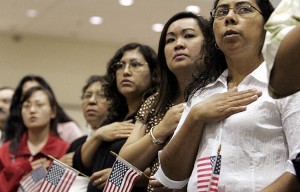
An analysis of data from the 2010 Census by the National Association of Latino Elected and Appointed Officials (NALEO) Educational Fund supports what many experts have been saying since the Census Bureau released its first data late last year, Latinos should see increased representation as a result of reapportionment.
On Tuesday, NALEO released its study that found in one state alone – South Carolina, the Hispanic population grew by as much as 117 percent. And the eight states that gained congressional seats did so by the growth in their Hispanic populations. Many states that did not gain seats staved off losses by the increase in Latinos.
“The growth of the Latino population is reshaping our nation’s political geography. The 2011 redistricting process will map the future of our representative democracy for the next decade, and those who are drawing district lines must recognize that growth and ensure that Latinos can choose their elected leaders,” Arturo Vargas, executive director of NALEO, said.
To ensure the redistricting process is fair and accurately reflects the gains for the Latino population NALEO is now working with Latino politicians and community leaders so that any potential “irregularities and injustices” in procedure may be reported.
“Historically, politicians have used redistricting to discriminate against minorities,” Vargas said. The 1965 Voting Rights Act bars the creation of districts that may dilute the votes of under-represented minorities and Vargas is calling for states to follow the law.
Earlier this week, La Plaza reported that the Mexican American Legal Defense and Education Fund (MALDEF) is doing the same by monitoring states to ensure they comply with the federal law so that Latinos see their numbers accurately represented in Congress. In 2000, MALDEF successfully challenged the redrawing of a majority Hispanic Texas district that weakened the Latino vote after the 2000 census.
“Not everyone will agree on where the lines get drawn,” Tom Perez, assistant attorney general for civil rights at the Justice Department, said. “What is important, in my judgment, is that the plan that emerges is one that everybody can stand because they had the opportunity to be part of the process.”
NALEO says it will focus its efforts on organizing community leaders in states it views as priorities, which include California, Nevada and Florida.